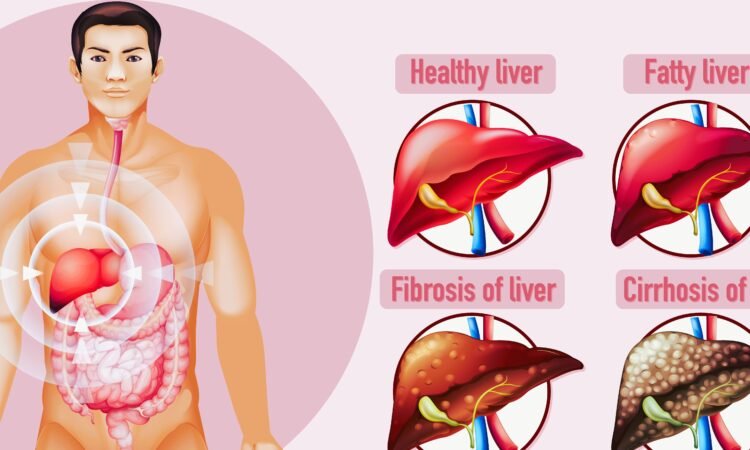
Causes of Fatty Liver:
- Obesity: Excess weight, especially around the abdomen, is a primary risk factor.
- Insulin Resistance: Conditions like type 2 diabetes and metabolic syndrome contribute to fatty liver development.
- High Blood Sugar Levels: Elevated glucose levels can lead to fat accumulation in the liver.
- High Fat Diet: Consuming foods high in saturated fats and sugars can contribute to fatty liver.
- Excessive Alcohol Consumption: Heavy drinking is a common cause of alcoholic fatty liver disease.
- Genetics: Genetic factors may predispose some individuals to develop fatty liver.
- Medications: Certain medications, such as corticosteroids and some cancer drugs, can cause liver fat buildup.
Symptoms of Fatty Liver:
- Fatigue: Feeling tired or weak despite adequate rest.
- Abdominal Pain: Discomfort or pain in the upper right side of the abdomen.
- Swelling: Swelling in the abdomen or legs due to fluid buildup.
- Enlarged Liver: The liver may become enlarged and tender to the touch.
- Jaundice: Yellowing of the skin and eyes due to liver dysfunction.
- Loss of Appetite: Reduced desire to eat or feeling full quickly.
- Nausea and Vomiting: Digestive issues such as nausea or vomiting may occur.
- Confusion or Difficulty Concentrating: Cognitive symptoms may develop in advanced stages.
Remedies for Fatty Liver:
- Healthy Diet: Consume a balanced diet rich in fruits, vegetables, whole grains, and lean proteins. Limit saturated fats, sugars, and processed foods.
- Weight Loss: Gradual weight loss through diet and exercise can help reduce fat buildup in the liver.
- Regular Exercise: Engage in regular physical activity, such as brisk walking or swimming, to improve liver health and metabolism.
- Limit Alcohol: If alcohol consumption is a factor, limit or avoid alcohol entirely to prevent further liver damage.
- Manage Medical Conditions: Control underlying conditions like diabetes, hypertension, and high cholesterol through medication and lifestyle changes.
- Stay Hydrated: Drink plenty of water to support liver function and detoxification.
- Herbal Supplements: Certain herbs like milk thistle and dandelion root may help support liver health, but consult with a healthcare provider before taking supplements.
- Avoid Toxins: Minimize exposure to environmental toxins and chemicals that may harm the liver.
- Regular Check-ups: Visit a healthcare provider regularly for liver function tests and monitoring of fatty liver progression.

For fatty liver, herbal supplements and medications may be used to complement lifestyle changes and promote liver health. Here are some options:
Herbal Supplements:
- Milk Thistle: Known for its liver-protective properties, milk thistle (Silybum marianum) contains silymarin, a compound with antioxidant and anti-inflammatory effects.
- Dandelion Root: Dandelion root (Taraxacum officinale) is believed to support liver detoxification and bile production, aiding in digestion and liver health.
- Turmeric: Curcumin, the active compound in turmeric, has anti-inflammatory and antioxidant properties that may benefit liver function and reduce liver fat accumulation.
- Artichoke Extract: Artichoke extract is thought to promote bile production and liver detoxification, potentially supporting overall liver health.
- Schisandra: Schisandra chinensis is an adaptogenic herb that may help protect the liver from damage caused by toxins and oxidative stress.
Medications:
- Vitamin E: Studies suggest that vitamin E supplements may help reduce inflammation and oxidative stress in the liver, particularly in non-alcoholic fatty liver disease (NAFLD).
- Omega-3 Fatty Acids: Omega-3 fatty acids, found in fish oil supplements, may help reduce liver fat and inflammation in individuals with fatty liver disease.
- Pioglitazone: This medication is sometimes prescribed to improve insulin sensitivity and reduce liver fat accumulation in individuals with non-alcoholic fatty liver disease (NAFLD).
- Metformin: Metformin, a medication commonly used to treat type 2 diabetes, may help reduce liver fat and improve insulin sensitivity in individuals with fatty liver disease.
- Ursodeoxycholic Acid (UDCA): UDCA is a bile acid that may be prescribed to treat certain liver conditions, including primary biliary cholangitis and non-alcoholic fatty liver disease (NAFLD).
Important Considerations:
- Always consult with a healthcare professional before starting any herbal supplements or medications, especially if you have underlying health conditions or are taking other medications.
- These supplements and medications should be used as part of a comprehensive treatment plan that includes lifestyle changes such as diet and exercise.
- Herbal supplements are not regulated by the FDA in the same way as medications, so it’s essential to choose reputable brands and follow dosage instructions carefully.
Note:
While herbal supplements and medications may offer potential benefits for fatty liver, they are not a substitute for lifestyle changes such as maintaining a healthy diet, exercising regularly, and avoiding alcohol and toxins. Always consult with a healthcare provider for personalized recommendations based on your individual health needs.




